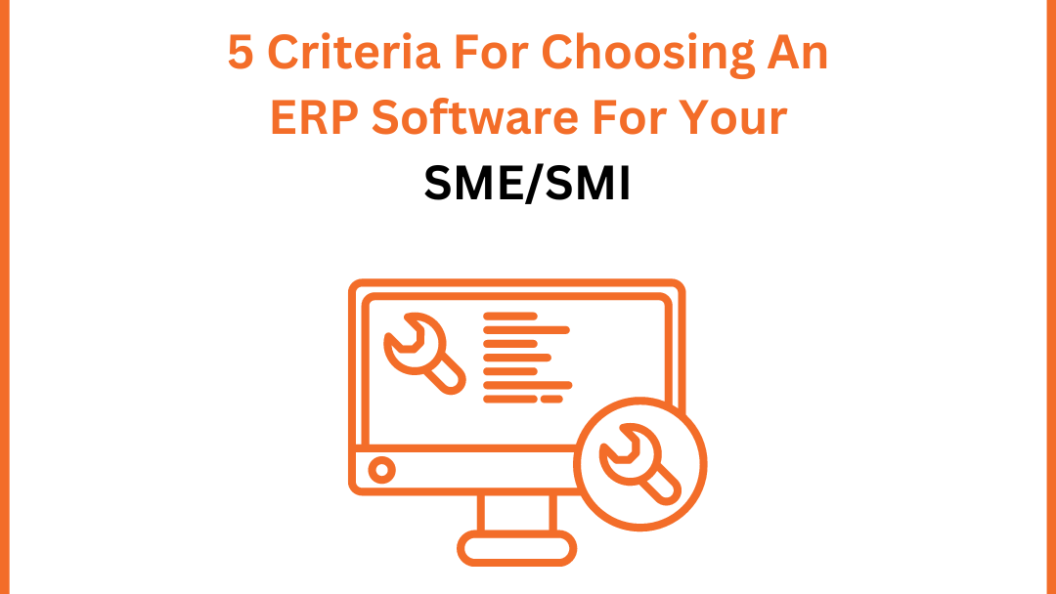Whether it is a first ERP project for your SME or the change of an existing solution, the choice of ERP software should not be taken lightly. Indeed, choosing the right ERP will positively impact the performance and productivity of your business. Before starting to compare the different solutions on the market, the first step is to precisely define and formalize your needs.
If your SME is already equipped and you hesitate to renew your current management solution, discover our article on the 5 reasons to change your ERP software.
So which ERP to choose for your SME and how? Among the criteria for selecting an integrated management software package (ERP), we suggest that you study certain fundamentals to take into account before you decide. Then, you can make a comparison of the ERPs on the market.
- Knowledge Of Your SME/SMI Business
Some integrated management software packages can be adapted to a very broad industry spectrum (Trading, HR, Project, Production, Process, Logistics, Stock, etc.) and others are oriented toward a specific industry, sector, or profession.
Choose An ERP Solution Adapted To Your SME/SMI Specificities
When looking for an integrated management solution, SMEs regularly turn to publishers of generalist solutions with a strong reputation. This type of ERP, which is both “generic” and often oversized, involves more adaptations. Adaptations that increase the complexity, risks, deadlines, the costs of an ERP project for SMEs and also add difficulty to future updates.
Conversely, ERP software geared to your field of activity allows you to have a ready-to-use solution much more quickly, better expertise, and fewer specific developments to plan for.
Choose An ERP Integrator Who Understands Your Business
Choosing an ERP integrator with expertise in your industry is just as important. With knowledge of your industry, the integrator will be able to analyze and resolve problems more effectively, saving you time and money.
- Functional Coverage And System Agility
Your future ERP must offer a favorable environment for decision-making and be flexible enough to adapt to your organization and the needs that you have previously formulated. It should in no way force you to change your processes. Your ERP software must ensure the proper management of information flows between the different departments of your company: sales, production, accounting, purchasing, and management.
Flexibility And Adaptability Of The Software To The Medium-Term Strategy
The functionalities offered by an ERP must be able to meet at least 80% of the immediate needs of your organization but also the medium-term needs. Indeed, your requirements and your needs at the moment should not be the only arguments that guide you in your purchase decision.
It is, therefore, necessary to reflect on certain possible scenarios that can be part of the company’s development and medium-term strategy: internationalization, the opening of new production sites, staff mobility, new markets, etc.
The selected solution must be flexible and modular enough to support you toward new realities. If the ERP you want has excessive limitations in terms of functionality and customization, it is advisable to look elsewhere.
The selected solution must be flexible and modular enough to support you toward new realities. If the ERP you want has excessive limitations in terms of customization, it is advisable to look elsewhere.
- User Experience And Adoption Of Your ERP Software Within Your Company
The adoption and appropriation of ERP software by the personnel of the company is a major issue and must be taken into consideration.
Naturally, a good ERP must be able to present the right information to the right people at the right time. But it must also be intuitive, and easily customizable.
Each employee of the company, whatever their function, will have to work daily with this new tool. Perhaps even employees who are not users of the current system will have to use this new ERP.
- Medium-Term Costs
The cost of ERP software is a fundamental issue. But too often, the company limits itself to considering the initial costs whereas it is essential to take into account the total costs over the medium – long term to compare the offers and their ROI.
Even though business models are changing faster than in the past, an ERP system should be seen as a long-term investment. According to several studies, an integrated management software package has a life cycle of 8 to 10 years on average.
- Sustainability And Quality Of Support
Sustainability must be verified at the level of the product itself, but also at the level of the service provider who will deploy the solution, and above all ensure support in the years that follow.
Ensuring the sustainability of software is not easy when you are not an IT specialist, especially considering that companies change ERP software every 10-12 years.
But do not hesitate to ask questions about the technologies used, and the architecture of the software, or even ask to have a presentation of the technical developments that have been made in recent years on the software. Many solutions available on the market today are more than 30 years old, and if technically the product has not evolved at all, this should concern you.
Beyond the solution, it is essential to choose the right partners because the human factor is the key to the success of your ERP project. Do not hesitate to inquire about after-sales service, customer service, ticket management, etc.
You must therefore carefully analyze the profile of the integrator and the ERP editor before you start. They will be present for several years at your side and will guarantee the performance of the system put in place. Be all the more vigilant if you are considering an open-source solution.


